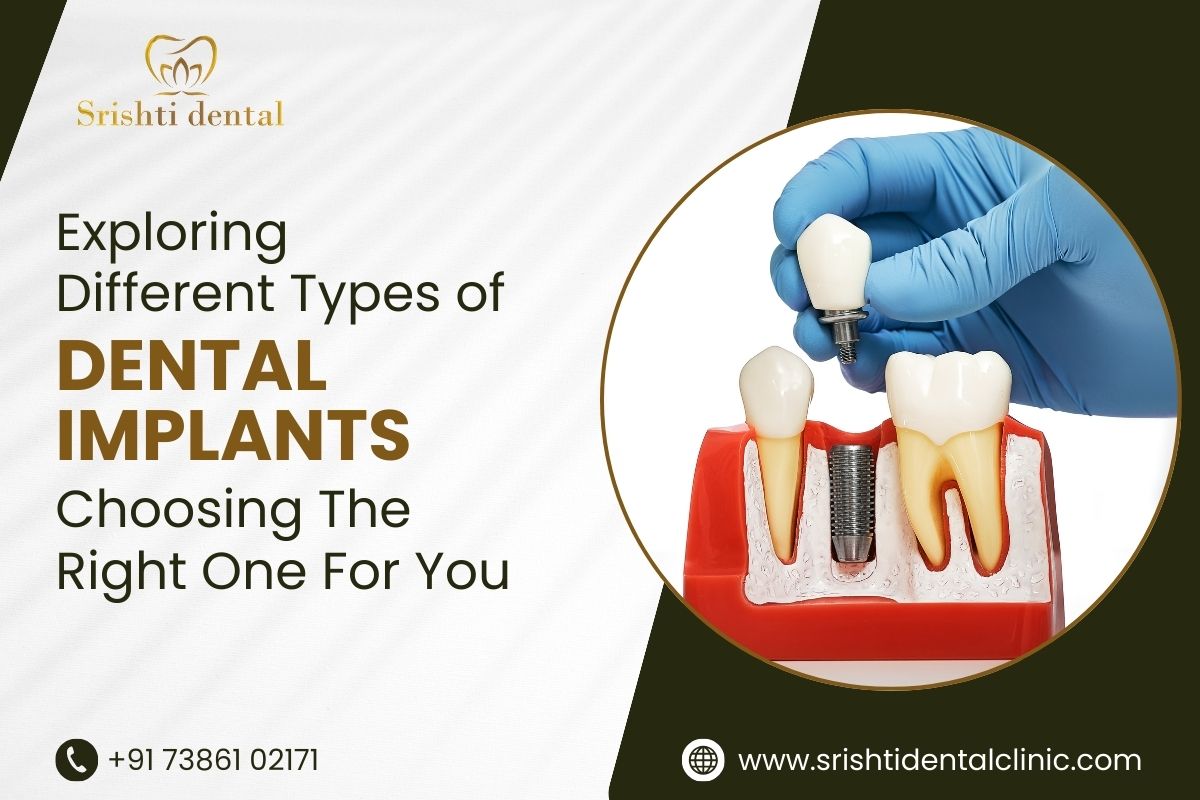Exploring Different Types of Dental Implants: Finding the Right One for You
If you’re considering dental implants to restore your smile or improve your oral health, you might be surprised to learn that there are several types to choose from. Each type has unique features and benefits, so it’s important to understand all your options before deciding. Let’s break down the different types of dental implants to help you find the one that’s right for you.
1. Endosteal Implants: The Most Common Choice
Endosteal implants are the most widely used type of dental implant. These are surgically placed directly into your jawbone, acting as a foundation for replacement teeth like crowns, bridges, or dentures. Made from titanium, a material that easily integrates with the bone, endosteal implants are strong and durable.
Best for: People with healthy jawbones and good oral health.
2. Sub-Periosteal Implants: For Those with Low Bone Density

Sub-periosteal implants might be a better option if your jawbone isn’t thick enough to support regular implants. Instead of being placed inside the bone, these implants rest on top of it, just beneath the gum tissue. A metal framework is used to hold the prosthetic teeth in place. These are perfect for patients who can’t undergo bone grafting or prefer a less invasive option.
Best for: People with insufficient jawbone who want to avoid bone grafting.
3. All-on-4 Dental Implants: A Full Set with Just Four Implants
The All-on-4 technique is a game-changer for those who need a full set of teeth. Rather than placing an implant for each missing tooth, this method uses just four implants per arch (top or bottom) to secure a full set of prosthetic teeth. It’s faster, requires less bone grafting, and provides excellent support compared to traditional dentures.
Best for: People missing most or all teeth in one or both arches.
4. Zygomatic Implants: For Severe Bone Loss
If you’ve experienced significant bone loss in your upper jaw, zygomatic implants may be the solution. These implants are anchored into the zygomatic bone (the cheekbone), rather than the jawbone, providing strong support without the need for bone grafting. They allow for quicker placement of prosthetic teeth, making them a great option for those with severe bone loss.
Best for: People with major bone loss in the upper jaw.
5. Mini Dental Implants (MDIs): Small, Simple, and Effective
Mini dental implants are a smaller and less invasive alternative to traditional implants. These are often used to stabilize dentures or replace smaller teeth. MDIs consist of a titanium post with a ball at the end, which holds the crown in place with a rubber O-ring. They’re less traumatic to surrounding tissues and require a simpler procedure, leading to faster healing.
Best for: People with minimal bone density or those who need a less invasive procedure.
6. 3-on-6 Implants: A Hybrid Solution
The 3-on-6 implant system is a unique approach where three dental bridges are attached to six implants. This offers an excellent alternative to traditional dentures, as it doesn’t require synthetic gums and provides a more aesthetic result. It’s ideal for people who need a full arch of teeth but don’t want to deal with the challenges of multiple implants.
Best for: People looking for an alternative to permanent dentures using fewer implants.
Key Factors to Consider Before Choosing Your Implant
Choosing the right implant relies on several factors, including:
- Bone Density: If your jawbone is too thin or weak, certain implants (like sub-periosteal or zygomatic) may be better suited for you.
- Gum Health: Healthy gums are essential for implant success. Gum disease can lead to implant failure.
- Overall Dental Health: If your other teeth are in poor condition, it could affect the outcome of your implant.
- Health Conditions: Conditions like diabetes or smoking can impact healing and the long-term success of your implants.
Choosing the Right Dental Implant for You
When deciding on the best dental implant, it's crucial to consult your dentist. If you have enough bone, endosteal implants may be suitable. For multiple missing teeth, consider implant-supported bridges or dentures. Zygomatic implants are an option for significant bone loss.
Ultimately, your dentist will suggest the best choice based on your needs and budget. Dental implants offer a durable, comfortable, and functional long-term solution for tooth replacement. If you are looking for dental implants in Madhapur, visit a trusted clinic like Srishti Dental, which can provide personalized guidance. With the right implant, you can restore your smile and improve your quality of life!



